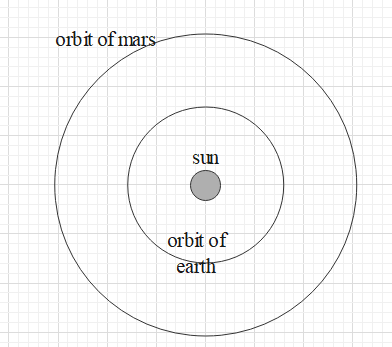
How long will it take to reach mars from the earth?

A. 5 days
B. 6 days
C. 60 days
D. 80 days

Answer
588.6k+ views
Hint: To reach mars from earth, one must first escape the gravitational pull exerted by the earth. If an object is released from the surface of earth with the escape velocity, the object will escape the earth’s gravity and then it can reach mars. Divide the distance between mars and earth by the escape velocity from earth to find the time.
Formula used:
$\text{time = }\dfrac{\text{distance}}{\text{speed}}$
Complete step by step answer:
Every object in the universe is attracted by the gravitational force of another object. Hence, small objects like us are bound to the gravity of a larger body like planet earth.
We humans are constantly being pulled by the gravitational force of the earth. If we want to reach another planet like Mars, then we have to escape the gravitational force exerted by Earth.
For a given object to escape the gravity of the earth, it must be released from the surface of the earth with a velocity equal to or greater than the escape velocity. If the object is launched with the escape velocity, it will have enough energy to overcome the gravitational pull.
The value of escape velocity for earth is equal to v =$11200m{{s}^{-1}}$.
The average distance between the earth and the mars is d = $7.8\times {{10}^{10}}m$.
Let the time to reach mars from earth be t.
Therefore, by using the formula $\text{time = }\dfrac{\text{distance}}{\text{speed}}$, we get $t=\dfrac{d}{v}=\dfrac{7.8\times {{10}^{10}}}{11200}=6964286s$.
Divide the time t by $3600\times 24$ to convert it into days.
$\Rightarrow t=\dfrac{6964286}{3600\times 24}\approx 80days$.
Hence, it will take about 80 days to reach mars from earth.
So, the correct answer is “Option D”.
Note:
Although when a body is released with a velocity equal to or greater than the escape velocity, it escapes from the gravitational pull, but it does not travel with a constant velocity. We have assumed that the average speed will be close to the escape speed. Also, travelling in a straight line path from one planet to another is not preferable and hence in real life it takes more time to cover such distances.
Formula used:
$\text{time = }\dfrac{\text{distance}}{\text{speed}}$
Complete step by step answer:
Every object in the universe is attracted by the gravitational force of another object. Hence, small objects like us are bound to the gravity of a larger body like planet earth.
We humans are constantly being pulled by the gravitational force of the earth. If we want to reach another planet like Mars, then we have to escape the gravitational force exerted by Earth.
For a given object to escape the gravity of the earth, it must be released from the surface of the earth with a velocity equal to or greater than the escape velocity. If the object is launched with the escape velocity, it will have enough energy to overcome the gravitational pull.
The value of escape velocity for earth is equal to v =$11200m{{s}^{-1}}$.
The average distance between the earth and the mars is d = $7.8\times {{10}^{10}}m$.
Let the time to reach mars from earth be t.
Therefore, by using the formula $\text{time = }\dfrac{\text{distance}}{\text{speed}}$, we get $t=\dfrac{d}{v}=\dfrac{7.8\times {{10}^{10}}}{11200}=6964286s$.
Divide the time t by $3600\times 24$ to convert it into days.
$\Rightarrow t=\dfrac{6964286}{3600\times 24}\approx 80days$.
Hence, it will take about 80 days to reach mars from earth.
So, the correct answer is “Option D”.
Note:
Although when a body is released with a velocity equal to or greater than the escape velocity, it escapes from the gravitational pull, but it does not travel with a constant velocity. We have assumed that the average speed will be close to the escape speed. Also, travelling in a straight line path from one planet to another is not preferable and hence in real life it takes more time to cover such distances.
Recently Updated Pages
Master Class 11 Computer Science: Engaging Questions & Answers for Success

Master Class 11 Business Studies: Engaging Questions & Answers for Success

Master Class 11 Economics: Engaging Questions & Answers for Success

Master Class 11 English: Engaging Questions & Answers for Success

Master Class 11 Maths: Engaging Questions & Answers for Success

Master Class 11 Biology: Engaging Questions & Answers for Success

Trending doubts
One Metric ton is equal to kg A 10000 B 1000 C 100 class 11 physics CBSE

There are 720 permutations of the digits 1 2 3 4 5 class 11 maths CBSE

Discuss the various forms of bacteria class 11 biology CBSE

Draw a diagram of a plant cell and label at least eight class 11 biology CBSE

State the laws of reflection of light

10 examples of friction in our daily life




